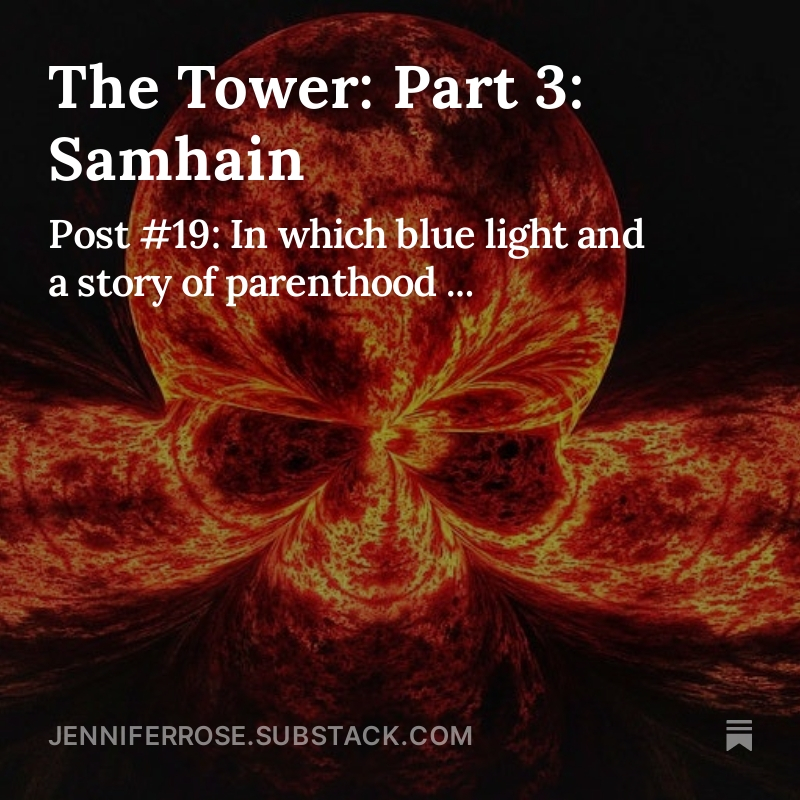by Jenny Rose | May 11, 2024 | Connection & Community, Emotional Intelligence, Shadows
… and she met a bear. She froze, watching it watching her, seeing the long claws, the muzzle raised to sniff the air, the marvelous deep pelt. She thought about everything she’d ever heard about dealing with bears. She stood still, attempting to convey the energy of no-harm.
The bear let out a “whuff” of breath, turned, and shambled away.
THE END
Once upon a time a woman walked through the woods and met a man she did not know. He made no eye contact, said nothing, and walked on. The woman followed his lead and ignored him, continuing on her way in a direction well away from his. She was conscious of a new alertness, a slight acceleration in her pulse. Her peaceful walk, her gratitude and appreciation of the balm of nature, her healing solitude, now took on the aspect of carelessness and risk. She knew some would say she was asking for trouble to walk in the woods alone. Was her comfortable clothing provocative? Were her jeans too tight? Did they send a signal that she wanted sex? Where, exactly, was she? If she called for help, could she be found quickly? Was she sure what direction she was walking in? She didn’t want to catch up to the man, didn’t want him to think she was following him or trying to get his attention. She didn’t want to linger in case he’d doubled back and was behind her. How fast was too fast? How slow was too slow? What was the fastest way back to her car?
She stopped, hesitating, sheltering behind a thick tree. Maybe the man was harmless. Maybe he had come to be alone and quiet, too. Maybe he’d hardly noticed her. Maybe he was a good man like her brother, her friends.
Maybe he was parked near her car and would wait for her to come out of the woods …
TO BE CONTINUED
Once upon a time a woman walked through the woods and met a man she didn’t know. He made eye contact with her, smiled, said, “How are you?”
The woman made her face smooth and calm, but inside she shrank and adrenaline kicked through her. Should she smile? She’d been told not to smile at strange men, lest it be misread. Should she reply to his greeting? Should she walk on without acknowledging him, or would that make him mad? Or hurt his feelings? (Probably he was a perfectly nice, harmless man.) Did she have anything she could use as a weapon? She’d seen no other cars when she parked; was anyone within earshot?
Her thoughts raced. Her steps slowed while she considered what to do. She smiled slightly without meeting his eyes. She didn’t speak and didn’t stop. As she walked away, she listened for sounds of him behind her, but all she could hear was the hammering of her heart. She didn’t dare look over her shoulder in case he was behind her and took it as encouragement. She felt naked. Were her jeans too tight? She wanted to take off her jacket and tie it around her waist, but she didn’t want to do anything to make him think she was afraid of him. She forced herself not to run. She lengthened her stride, standing tall, trying to project assertiveness.
She began to circle widely, back to where she’d parked her car …
TO BE CONTINUED

Photo by freestocks.org on Unsplash
I’m not on TikTok (God forbid), but I’ve been hearing about a recent viral sensation around the question of whether, as a woman, we’d rather meet a bear in the woods or a strange man. The vast majority of women would much prefer to meet a bear. The question was posed to me with no context and I didn’t need any time to think about it. I’d rather meet a bear, of course. A bear isn’t going to rape me. Bears don’t carry guns, abduct women, or hurt women for pleasure. I’ve often had brief interactions with black bears, both here in Maine and in Colorado. I’m not food. Any food I’m carrying can be tossed aside. As long as I don’t inadvertently get between a mom and her cubs, I’m not a threat, not something that needs to be attacked. If I am attacked and mauled, I’d far rather be hurt that way, or even killed, than fall into the hands of a twisted man. Bears are predictable. They don’t stalk, torture, lie, manipulate, kidnap, use substance, or terrorize for the fun of it.
A man might do anything.
A bear would recognize me as a human being. A man might not.
I’m told there’s a lot of anger from men about this answer, to which women respond with, “Thanks for illustrating the point so well. See? That anger, that language, that defensiveness and denial are exactly why we’d rather meet a bear than a man.”
And around and around we go.
Interestingly, an article I found that talked about this said when a man was asked if he’d rather his daughter met a bear or a man while walking alone in the woods, he eventually chose a bear.
I think about these things more than I have in years. I think about them every day at work, where I interact with all kinds of people as a professional, and every day as I walk the few blocks to and from work. I’m angry about it, because I assumed by the time I was 60 this sort of thing would be behind me. I forget this kind of behavior and threat really has nothing to do with my age and attractiveness; merely being a female is enough. For some men.

Photo by Sam Burriss on Unsplash
There’s no point is saying “not all men” because everyone knows that. Of course not all men are a threat to women; that’s not the point. The point is all men might be a threat and women can’t tell. We have to assume “all men,” for our own safety until we’re satisfied the man we’re interacting with is OK. Sadly, we’re often wrong. The vast majority of male violence against women and children is perpetrated by someone known, either a close connection or an acquaintance.
Men close to me who I trust have told me I’m “too nice.” I’m too warm. I’m too empathic. It’s infuriating. All my life I’ve worked with people. I like people (mostly). It doesn’t occur to me commiserating with a (overweight, completely unattractive, past middle-age old hippie with six strands of hair in a ponytail) patron over chronic back pain (beer belly) could possibly be seen as a come-on, an invitation to flirt and step over boundaries. Until it happens. And then I’m furious with myself, with him, with a world where a 60-year-old female lifeguard can’t say, “Jeez, sorry about your bad back,” to a male patron without having to spend the next month acting like a stone-cold bitch in order to reclaim boundaries.
It’s exhausting, and nearly impossible to explain to a man. It’s simply not in their experience and most of them can’t imagine living this way. But every woman knows exactly what I’m talking about. The divide between women and men gets deeper and deeper, fills with resentment and even hatred, because some men can’t or won’t understand our reality. It breaks my heart. Healthy men and women need one another. I don’t think we can effectively address the problem of male violence against women and children without healthy men.
I’m also thinking about this because we’re about to embark upon a major remodeling project in our home, which means we’ll have some months of workmen coming and going. I like men and I love watching men at work, learning about structure and building, observing, chatting. I would also like to occasionally make cookies or muffins, buy pizzas, and find other ways to show appreciation for the hard and expert work these guys will do. I want to communicate clearly and assertively with the contractor to make sure we’re on the same page and we understand one another’s expectations. I want to make healthy, respectful professional connections.
But I’ll probably let my male partner do most of the interfacing. He’s the one at home all the time anyway. It’s safer for him. I will connect with the contractor and write checks, but otherwise I’ll make myself small, stay out of the way, and try not to attract attention, including refraining from expressing “too much” gratitude or warmth. Whatever the hell that means.
It makes me sad. This is a big adventure for us. I’d like to have fun, embrace the chaos and change, enjoy the process and get to know the people who are making it possible. But the risk is too great.
This bear versus man viral question is important because of the spotlight it shines on female experience. Instead of an opportunity for further male outrage and denial or stoking more hatred for men among women, it could be a moment to foster a better understanding of the experience of having to live defensively every single day as a woman, knowing even that may not save us from male violence, and if we do fall victim to male violence, we’ll be blamed for it. (Our jeans were probably too tight. Or we shouldn’t have been walking alone.)
Or we could just go talk to the bears.
Questions for women:
- Would you rather meet a man you don’t know or a bear while walking alone in the woods?
- When a strange man is friendly with you in person (and you’re not looking for a date or a lay), what do you do?
- What do you routinely do in an effort to avoid male violence?
Leave a comment below!
To read my fiction, serially published free every week, go here: 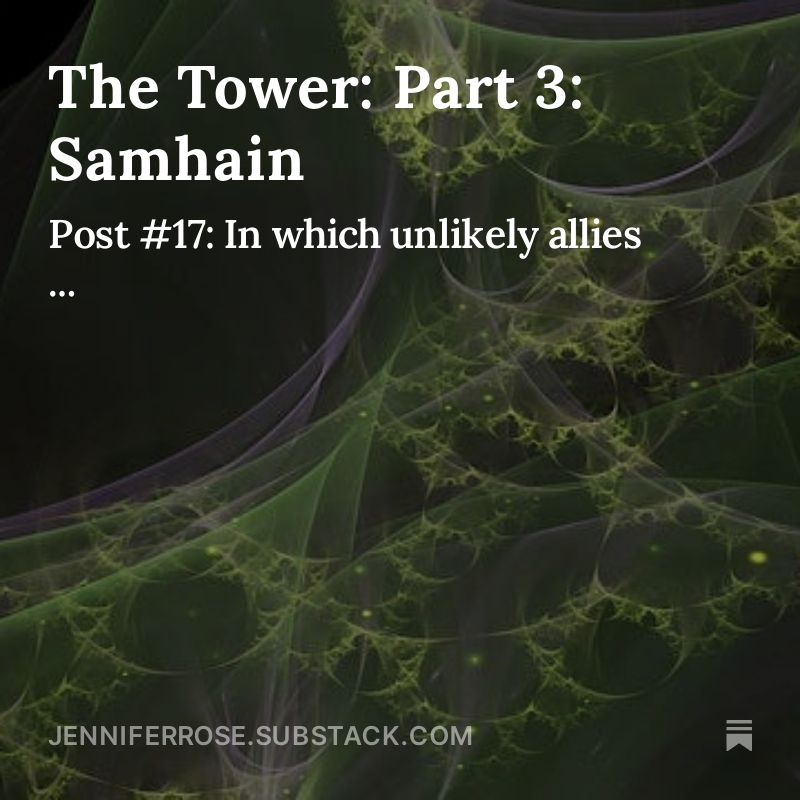
by Jenny Rose | Aug 4, 2016 | Connection & Community, Emotional Intelligence
Stories. How many stories can you tell about your life?
Story has always been deeply embedded in the human experience. Every piece of art tells a story. We read, watch television, go to movies, listen to the news, fall in love with music. Stories, all.
Stories teach, entertain, connect, inspire and guide us.
Stories are prisons and torture chambers. They brainwash and manipulate. They can be powerfully limiting.
The paradox of story lies in the power we give it.
Think about a story from your own life. Something painful. Likely it’s a story you’ve told yourself many times. It’s important. It’s part of who you are and how you understand yourself. It’s a place from which you look at the world. It’s absolutely True. You know. You were there. It was such a crippling experience you can’t ever, ever forget.
Stories can’t happen in a void, so there’s an event of some kind, an action, a word, a relationship, other characters in your story.

Photo by Takahiro Sakamoto on Unsplash
Let’s say your story is about four people who spend an hour together on a walk. In that hour everybody sees, smells and hears, thinks and feels different things. After that walk, and maybe for years afterward, each of those four people can tell a story about that day, that walk, that experience. Every one of those stories is partly true. Every one of those stories is inadequate and incomplete. The truest story is the one all four people tell together. If one person’s story is refused, denied, disbelieved or lost, all four people have lost something important out of that hour of their lives. They’ve lost an opportunity for understanding, for compassion, for connection and for becoming just a little bit bigger.
The thing about story is that we create it. Something happens. We have an experience. We have feelings, like mad, glad, sad or scared. We have thoughts about our feelings. We make up a story. We tell it to ourselves over and over again as we try to make sense of our experience, or recover from some hurt. We believe our story to the point that we refuse to consider changing it. We behave as if our story is True.
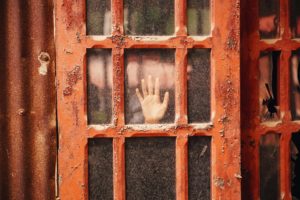
Photo by SHTTEFAN on Unsplash
Now we have a story that imprisons us. The story has all our power. We hurt people, break relationships and viciously defend our story. We will kill people, including ourselves, to maintain our story. Not only that, others must accept our story in its entirety. They must never question it, add to it or take away from it. Our story becomes us. A threat to our story becomes a threat to our life.
We’ve made something up, chosen to believe in it and now it rules us.
A lot of people talk about truth and lies as though one is black and one is white. As a storyteller, a writer and a human being, I question that. What is truth, really? If I was walking with you on that day and I saw a beautiful grass snake and you saw a dangerous serpent, which one of us is lying? What is the truth? I was charmed, you were horrified. So, I must be a sensitive scientist type with big glasses and a mouthful of Latin. And you’re a beautiful, sexy woman with big boobs and brown eyes who needs to be taken care of in the terrifying outdoors.
There. That’s my story. I’m sticking to it. Don’t you dare try to give me a different version.
See what I mean?
Isn’t the truth that two people saw a snake and had two different experiences and sets of feelings around it? Don’t we all have histories, fears, beliefs, prejudices, expectations and filters through which we experience life? Are yours right and mine wrong? Are mine right and yours wrong?
Can’t we allow room for everyone to experience what they experience?
Some people lie, deliberately and with intent. We all know people like that. We learn quickly not to trust them.
Some people distort. They’re caught up in their story about themselves, about the world, about others. They’ve been deeply damaged and wounded, or they struggle with addiction, or they have health problems, or they take medication, or they struggle with mental illness. Am I prepared to call them liars?
No. But I recognize the danger of some of their stories.
Does investment in a distorted story mean the storyteller is not a valuable person worthy of love and compassion? I hope not. I’ve my own set of distorted stories. I think we all have.
Other, very dangerous people deliberately manipulate with story. They invalidate yours in favor of theirs. They tell you you’re wrong, you didn’t understand, you’re too sensitive, you’re too dramatic, you’re too crazy; you’re hateful, bigoted, disloyal, a liar. They tell you your story didn’t happen, that they didn’t hit you, even though there’s blood in your mouth.
So what do we do about story — ours and everyone else’s?
Maybe the most important thing is to be aware that much of what’s happening in our head is a story. It might be partly true. It might not be. It’s certainly part of something larger than our point of view. Our feelings are ours and we need to honor them, but our thoughts about our feelings can become a real problem.
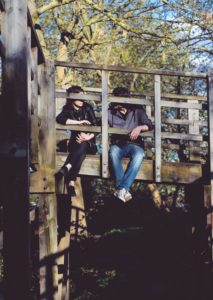
Photo by Toa Heftiba on Unsplash
We could ask others about their stories. We could be open, curious, nonjudgmental, compassionate, respectful and prepared to be enriched by someone’s perceptions and experiences. We could, in short, build healthy connection.
If we’re holding tight to a story that hurts us, angers us, or is otherwise destructive, we could go to other characters in the story, tell them how we feel and ask for help understanding the situation.
We can build trust and respect with ourselves. We can claim the power and dignity to form our own opinions about others, based on our own observations and experience, and decide when to build connection and when to limit it. We can refrain from repeating destructive stories to or about others. We can take responsibility for our own rigidity and blind spots; our intolerance, injustice and poor communication skills, and own that we might make mistakes in judgement.

Photo by James Pond on Unsplash
We can be wary and watchful of people who impose their stories on us. Some people use story like a hammer and chisel, relentlessly splitting connection and relationship. In the end they hurt themselves the most, but many a relationship has been lost because of this kind of behavior.
We can pay attention to red flags such as feeling confused, feeling torn, feeling overwhelmed, feeling exhausted by drama, and feeling dragged down or being asked to keep destructive secrets. Healthy people in our lives who truly love us will never try to split us from others or force us to make a “them or me” choice. Healthy people do not share destructive personal stories about others publicly, nor do they tolerate or enable this kind of behavior. Healthy people communicate honestly, directly and clearly and recognize the ineffectiveness of black-and-white thinking.
In the end, our only power lies within the circumference of our own lives. If we want others to give us a chance to speak when someone tells a distorted story about us, we must do the same for them. If we want to be heard, understood and treated with respect and compassion, we must extend those to others. If we’re hurt and angry, we must find appropriate and effective ways to talk about that, either with a professional or with others in our story. We can’t control what others say and believe about us. We can only live the most authentic lives possible and hope that our actions and words speak for themselves. We can be responsible for our own stories.
For more on the power of story, here’s another blog you might be interested in. Same subject, different writer. It’s titled Who Are You?
Also, here’s a link to a remarkable teacher, Byron Katie, who asks, “Who are you without your story?” I highly recommend her.
Do your stories about yourself limit you? Do your stories about others limit them? Can you consider another version of one of your stories? What needs to happen for you to revise one destructive story you’ve created?
All content on this site ©2016
Jennifer Rose
except where otherwise noted
by Jenny Rose | Jul 6, 2017 | Connection & Community, Emotional Intelligence
This week I’m exploring the idea of cultural appropriation. In the linked article, cultural appropriation is defined as “Taking intellectual property, traditional knowledge, cultural expressions, or artifacts from someone else’s culture without permission. This can include unauthorized use of another culture’s dance, dress, music, language, folklore, cuisine, traditional medicine, religious symbols, etc.” This definition provides a useful starting point, but it begs a couple of important questions.
I approach cultural appropriation from two different directions. I begin with a story I wrote years ago for oral telling. The story was inspired by the wonderful children’s author and illustrator Eric Carle . He wrote several books, among them Draw Me a Star. As a parent and librarian, I’ve bought, recommended and read aloud his books hundreds of times. You can look at ‘Draw Me a Star’ here .
The Artist
“Sing me a star …”
And the Artist sang a star.
It was a shining star.
“Color me a sun,” said the star.
And the Artist colored a glowing sun, a golden lion, a hillside of orange poppies, a burning fire, and a feather.
It was a red feather.
“Weave me a tree,” said the feather.
And the Artist wove branches and leaves and pieces of sky into a tree, and She wove fields and forests and deep, invisible roots, and a spider’s web.
“Build me a fence,” said the spider.
And the Artist built a fence and sculpted rocks and ice and sand and snow into a world.
It was a glorious world.
“Tell me a story,” said the world.
And the Artist began, “Once upon a time …”
It was a wonderful story.
“Tell me some more!”
So the Artist made all kinds of people to share all kinds of stories.
They were strong people.
The people said, “Teach us what love is.”
And the Artist said,
“Sing me a star …”

Photo by Leon Liu on Unsplash
Now set your burdens down for an hour and dance with me. Here’s the sound track I made for our community dance last Monday evening.
“Symphony of the Forest and Mysterious Island,” by Kitaro a Japanese artist.
“Maryam,” by Hamza Shakkur, from the soundtrack to the movie Bab’ Aziz , a Tunisian foreign film.
“Aye Lon Lon Vadjro,” by Angelique Kidjo , an African artist.
“Kozuma,” by Professor Trance and the Energizers, who perform multicultural Trance Dance music.
“Stars Align,” by Lindsey Stirling, an American violinist.
“Mwari,” from the album World of Rhythm.
“Pinguli Pinguli Giuvaccinu,” by Savina Yannatou , a Greek artist.
“Barcelona Nights” by Ottmar Liebert, a German guitarist.
“Symphony of Dreams and A Drop of Silence” by Kitaro.
I wouldn’t steal a pencil or a nickel. It’s easy to make a distinction between concrete objects belonging to me and those that don’t. Trying to define intellectual and cultural property, however, is another thing. Part of my integrity as a storyteller includes rigorously reporting the origins of my material to my audience. Part of my integrity as a librarian and a researcher includes investigating roots and versions of old stories and communicating that information to my audience so they get a glimpse of the amazing historical journey of human creativity and experience. Part of my integrity as a writer is to be open to the world of human beings around me in all its rich history, language, symbol, tradition, spirituality, expression, art, ideas and feelings.
Anyone who creates art or delves into old oral traditions realizes cultures are not so easy to distinguish from one another, and the farther back we trace certain artifacts, oral material, symbols and traditions, the more blurred the boundaries between cultures become. Part of my motivation in becoming a storyteller is to become a link in a long, long chain of humanity that reanimates old stories. Oral tradition survives because it speaks to the culture of human beings. Themes of love, birth, death, war, change and power engage everyone. The repeating horrors of colonization, genocide, slavery, plague and pestilence, massacre and religious persecution are embedded in the history of every culture on every continent.

Photo by NASA on Unsplash
It would be convenient to simplify the history of mankind into good/bad, victim/oppressor and black/white literally, as well as figuratively, but that’s an intellectually lazy and ignorant point of view. Science teaches us life is a complex, nonlinear, dynamic, holistic system, and every culture changes every other culture just by existing. Every species impacts every other species. Every organism impacts every other organism. It’s inescapable.
Culture is defined geographically, ethnically, politically, by religious belief, by shared history, by language and by physical types. All these factors and many others weave cultural definition. I define some of my cultural aspects and others also define me, sometimes accurately, sometimes ridiculously. Defining culture is like trying to catch fish with your bare hands.
Who is authorized to speak for their culture, and what gives them that authority? Who controls the sharing or withholding of cultural information? At what point do we qualify for inclusion in a culture? My own ancestry is a polyglot of Irish, Norwegian and German, at least. Am I Irish enough to be allowed to tell an Irish traditional tale? Does the fact that my skin is white prohibit me from dancing to African music and introducing others to artists like Anquelique Kidjo?
We have ample evidence that cultural purity is a fast track to cultural death. It doesn’t work in breeding animals, it doesn’t work in the plant world and it doesn’t work any better with humans. Life is not about maintaining divisions and isolated islands of purity. It never has been about that. Successful life is about biodiversity, cooperation, adaptation and hybridization. The attempt to maintain cultural purity is an attempt to restrain change, which is an attempt to harness life itself. Human beings, thank all the manifestations of divinity, are not that powerful.

Photo by Lukas Budimaier on Unsplash
What human beings are is creative. We are sensual. We thrive on expression and ritual. We hunger for spiritual nourishment. At our best, we’re observers, recorders, problem solvers, explorers and synthesists. We’re curious. As in the old stories, we go out into the world and seek our fortunes, our mates, our place, our families, our passion, our destinies and ourselves. Yes, there are plenty of madmen/women, megalomaniacs, destroyers and other pitiless, power-hungry, dangerous, destructive people out there. Entire human cultures have disappeared, leaving behind nothing but artifacts and fragments of language. Many, many other kinds of life have vanished as well, and many more are at risk. Yes, there are people who steal real property as well as intellectual property. There are people who would gladly wipe out whole groups of humans and other life, given the power. It’s happened before and it will no doubt happen again.

Photo by Jazmin Quaynor on Unsplash
Have you noticed, though? Life — human, animal, plant — goes on. No one can really steal our heritage or our identity, because those things reside within us. Plagiarism and duplication are sterile things. Culture persists. It might go underground for generations in order to survive, but it persists and eventually shows itself to the world again. Stories, music, traditional arts and crafts, religious rites, dance, clothing, jewelry, language and tools are all seeds of culture. When someone with cultural seeds in their pockets reaches across boundaries to another culture, powerful, life-sustaining, magnificent collaboration happens, the kind of collaboration that allows an ordinary person like me to create a multicultural dance track and lead a small group of people (all kinds of people) in dance, which is a human cultural tradition from the dawn of man/womankind. The mingling of cultures creates new cultures, as well as sustaining the original parent cultures. If one person reading this discovers new music to add to their lives and pass on, a long history of cultural tradition goes with it and is preserved. I’ve succeeded as a link in the chain going right back to the first humans.
Eric Carle has had a hand in shaping my life, along with hundreds of other authors and illustrators. His books were read to me when I was a child, and in turn I read him to other children, including my own. He’s a unique and beautiful artist. My appreciation for his work inspired my own creativity. I was also inspired by my brother, who is a gifted musician, and I dedicate ‘The Artist’ to him, out loud, every time I tell it. I take my copy of Draw Me a Star to every telling to pass around. I’ve told ‘The Artist’ dozens and dozens of times to all kinds of audiences, children as well as adults.
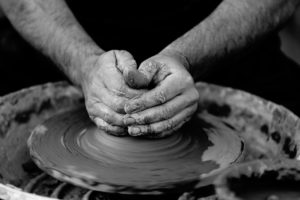
Photo by Quino Al on Unsplash
The story tells my truth. The act of creation is an act of love, appreciation and respect. Creation never happens in isolation. It’s never pure. It’s always a maelstrom of conscious and unconscious influence, memory, and inspiration from things seen, heard, read, felt and experienced. Culture is not static. It adapts, adjusts, persists, learns, discards, incorporates, borrows and contributes, or it dies.
Last week I wrote about making ourselves small. Cultural eradication makes the family of man smaller. Plagiarism kills creativity. Appropriation shrivels our souls. The threat of tribal shaming limits our joy in discovery and exploration outside our cultural boundaries. Choosing rigidity, hoarding and withholding our beautiful languages, our nourishing spiritual wisdom, our rapturous music, our skills and traditions, impoverishes us. Refusing to experience, explore and appreciate other cultures and their richness also impoverishes us. Sterility and isolation in, sterility and isolation out.
The greatest honor I can give the countless musicians, authors, artists, dancers, storytellers, photographers, sculptors, weavers, gardeners, mystics, filmmakers and other creators who grace the world is to see, to listen, to be touched, to weep, to laugh, to dance, to receive, to learn from, to be inspired by, and to add my own work to the dynamic, ever-changing culture of humanity.
All content on this site ©2017
Jennifer Rose
except where otherwise noted
by Jenny Rose | May 11, 2017 | Emotional Intelligence, Feelings, Happiness
For many years, I’ve been a story teller. I’ve told stories in nursing homes, schools, at seasonal events and in women’s circles. I think of stories as medicine, as guidance, as blueprints for living. Old stories from cultures around the world contain information we’ve forgotten or lost about how to live well.

Photo by Syd Wachs on Unsplash
It’s striking how often I share a familiar and oft-told story with an audience that suddenly turns out to be what I most need. Oral stories, if written on a page, look static and lifeless. They’re not. An oral story lives. It twists and turns and wriggles unexpectedly in the mouth. Every time I tell a story it’s a different telling than I’ve ever done before. Every time I tell a story I’m different than I was the last time I told it. Every audience is different.
I’ve discovered blogging is like that. As I blog, I think of the reader. I blog to make an external connection. As I create posts, though, I also discover deepened connection with myself. My writing reveals my truth to me, and shines a light on the places where I’m not living what I know is my truth.
Last week I posted about quitting. In essence, I gave permission to all of us to change, to grow, to seek happiness in our work and in our lives. Ever since I resigned from my job (last day will be Saturday) and wrote that post, I’ve noticed an internal feeling of rediscovery, freedom and fizzing joy.
I only worked 20 hours a week at that job, but the choice to force myself to do it, even though it didn’t make me happy or meet my needs, cast a shadow of apathy over the rest of my life. It dulled my response to my own distress. It fed all those powerful voices that tell us there’s no help for it. We have bills to pay. We have responsibilities, duties and obligations. The most sinister voice of all says this is the best we can hope for or deserve.
I was empowering fear, not love.
All of a sudden, I’m operating with new clarity, the kind of clarity that the right story at the right time brings. This week I’m acutely aware of what’s working well for me and what’s not. I feel my power to choose afresh. I’m not motivating out of fear. Somehow, fear is taking a vacation. I’m motivating out of curiosity, pleasure and the desire to actually be happy.
For me, this is a crime of immense proportions.
I want to be happy. It occurs to me this isn’t a childish pursuit. It’s the pursuit of real personal power.
I follow a blog by Dr. Sharon Blackie, who is a writer, psychologist and mythologist. I’m reading one of her books, The Long Delirious Burning Blue, which has a passionate delicacy I haven’t experienced in a new read for a long time.
Dr. Blackie recently returned to the place she calls home in Connemara, Ireland, and her last couple of blog posts are about taking a walk with her dogs on the land that she loves.

Photo by Takahiro Sakamoto on Unsplash
That’s all. Taking walks. She posts pictures of the lochs, a stream, the bog and the mountain. There are pictures of her dogs, and I imagined wet, muddy paws and soft black and white coats tangled with leaves and stems. I think these posts are among the most joyful and powerful things I’ve ever read, not because Dr. Blackie is an extraordinary scholar and writer, which she is, but because she writes as a woman who’s come home to the place she belongs after a long time away. Her delight and reverence for the land and the life it supports radiate from every word and picture.
That’s how I feel this week, but my homecoming is internal rather than external.
I’m familiar with some of my terrain. Over the years, I’ve learned some of what I am. Always, though, there have been caverns, edges and deep forest I haven’t explored. Perhaps I knew all of myself before my memory in this lifetime begins, but if so, I’ve forgotten.

Photo by Cameron Kirby on Unsplash
This week I’m a wanderer, an explorer, a solitary traveler in my own psyche. I leave my well-worn internal paths to roam under trees. I follow the sound of water. I read my own spoor and run my hands over moss-covered rocks. I hunt in vernal pools for singing frogs the size of my toes. I wade through bogs of memory, getting my feet muddy and losing my shoes.
I’ve found old, abandoned structures smelling of rot and damp where birds nest and bats cluster. I’ve stumbled upon shallow graves where, once upon a time, I discarded and abandoned parts of myself. I’ve tripped over fallen idols, are now covered in a lacy blanket of ferns, found forgotten altars and pulled mats of dead leaves out of fountains I haven’t seen in years so clear water can flow again.
I’ve found shed skins whispering and rustling with memory, nearly invisible overgrown paths, and ruts and scars from old burns, floods and landslides.
I suddenly remember the happy feeling of waking early in the morning and going straight outside. I release myself from the expectation that I’ll work well in the last third of the day, a thing I’ve never in my life been able to pull off. I listen to music I love. I read what interests and moves me. I write lists and journal entries, blog posts and edits for my book.
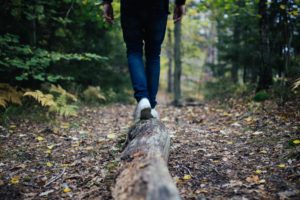
Photo by Jon Flobrant on Unsplash
Like Dr. Blackie’s dogs, I follow what catches my attention. I move along scent trails, noting the passage of all my selves, spiraling from what I’ve been to what I’ll become and back again. I dance from thought to thought, from word to word, from dream to dream. I cast myself into a wider pattern of life.
It’s not that I don’t want to do anything. On the contrary, I want to do a hundred things. I want to do much more than I did when I was structuring my time and energy around my job. I can hardly wait to get out of bed and see what the day brings. I want to play outside, take care of tasks inside, read, write, watch the birds at the feeders, stretch, dance, swim, listen to music, make a list and check things off, be present in my relationships, make new friends, pursue intriguing new connections, earn money joyfully, and see how much I can want and how gloriously I can dream.
I’ve written about leaving home before, and in that post I wrote that in some counterintuitive way leaving my old external home in Colorado allowed me to begin to finally come home to myself internally and reclaim my power. I’ll never think of home solely as a one-dimensional place in the world again. Home is not just a house, not just a beloved landscape, but the place where my dearest friend, my most passionate lover and my most loyal companion reside, along with my deepest power. Home is my own wide-flung arms, my own pulse and breath, my own joy. Home is me, myself.
Somewhere along the way, we forgot that the most important things are also the simplest. There’s great power in being happy. If happy is missing, life is muted and apathetic at best. This is when the power of boredom and the power to quit come to our aid. This is when choice becomes something we must fight to reclaim as if our lives depend on it … because they do.
Claiming the power of happy. My daily crime.

Photo by Senjuti Kundu on Unsplash
All content on this site ©2017
Jennifer Rose
except where otherwise noted
by Jenny Rose | May 26, 2024 | Connection & Community, Emotional Intelligence
I’ve always said I hate politics. In hindsight, what I was really expressing was discomfort with divisiveness and conflict, lies and deceits and power games. Talking about politics feels like pinning Jello to the wall. People throw labels and jargon around. Terms are not defined and agreed upon. True intent is obfuscated. Actions and words don’t line up. Contempt and outrage rule.
The last eight years have been brutal in the political arena. I have an internal list of words that send me into immediate flight from conversations and interactions. If I can’t flee, for example if I’m at work, I put on a neutral face and withdraw, leaving a robot to carry on until the subject has changed to vacations, or family, or gardening, or even the same personal health stories I’ve heard from patients and patrons many times before. Anything but politics.

Photo by roya ann miller on Unsplash
Yet everything feels politically charged right now. Every aspect of our culture, our basic needs, our planet, our economics, our bodies and our minds, winds up in an increasingly bleak morass of hatred, violence, fear, isolation, and manufactured confusion.
Interestingly, in my own fictional work, I’ve been stuck for some time in writing about a small egalitarian community whose harmony is disrupted by a member who actively seeks more power. The de facto leader, a woman, doesn’t know how to combat this aggression because I don’t know how to combat it!
Last winter my partner talked with me about a video series he’d found on YouTube called What is Politics? Before he was finished talking I was shaking my head. I wanted nothing to do with it. The words and terms are meaningless. It’s all just hate. It’s impossible to talk sensibly about and I don’t want to know more than I know; I don’t want to wander around in a toxic wasteland during my free time. Besides, I want to read, not listen to and watch YouTube.
(Yes, I am a bit of a snob that way.)
My partner sent me a link anyway. He’s persistent like that. I was duly annoyed. For some reason, I didn’t delete the link. One day when nothing in particular was going on I clicked through and watched it.
Irritatingly, I was impressed. The presenter (I think his name is Daniel) is smart, by which I mean he’s incredibly knowledgeable, well read, well spoken, and he’s a synthesist. He understands complexity. He has a sense of humor. He was not hateful and he did not speak in jargon. He pushed no ideology. He defined every single term he used. In fact, the very first thing he did was define politics as “anything related to decision making in groups.”
That simple, clear definition hooked me. I saw at once that politics are everywhere because politics are everywhere. My perspective widened from our current shameful global and national politics to include home, school, work, and neighborhoods. When two or more people are together anytime, anywhere, politics are in play. My resistance dissolved. I wanted to learn more. I sensed I was on the edge of figuring out how to solve my creative fictional dilemma.
My partner sent all the links to the video series and I settled down to go through the videos, one at a time. I use a split screen, taking notes on one side and watching the video on the other.
Politics is about power, the power to make decisions. It’s ridiculously simple. Without understanding it, I’ve been writing about politics for eight years on this blog as I explore choice and personal power. Power is something we all need to understand and master; it’s the cornerstone of emotional intelligence and living effectively.
This series has been the most valuable piece of learning I’ve engaged with since I learned emotional intelligence, more than ten years ago. I understand now why I’ve never been able to get a handle on politics, and why I’ve been so repulsed by the whole subject. Subconsciously, I’ve recognized the language games and manipulations, and I won’t deal in language games and manipulations. I don’t trust ideology, including my own. I don’t trust “news.” I don’t trust all the “worbs,” Daniel’s term for meaningless language no one defines clearly and correctly. Just about the only thing I do trust is that following the money behind every ideology, whether it be food, climate, aspects of gender and sexuality, geopolitics, religion, or elections, invariably uncovers corruption and reveals the puppet masters.

Photo by Tim Gouw on Unsplash
And we are the puppets. Nicely divided along manufactured lines. Emotionally manipulated into defensiveness, distrust, hate, and fear so any kind of unity against the powerful elites who have a stranglehold on the vast majority of wealth and decision-making becomes increasingly improbable. The economic inequality most of us stagger under, the thing we all have in common, cannot be clearly seen because we’re captivated by a thousand tempting but ultimately meaningless ways to hate and fear one another.
That’s just the way the people at the top of the hierarchy want it. We’re good little “patriots,” incapable of unifying.
I don’t usually choose willful ignorance. It’s not a useful choice, but until now I hadn’t found a clear, concise, pragmatic way to become educated about political terminology and history. I’ve never before recommended a video series. I hope you will check out What is Politics.
Questions:
- What are your current reactions to the subject of politics?
- What aspect of politics do you find particularly troublesome or uncomfortable?
- Do you feel more or less connected to family, friends, neighbors, and community than you did ten years ago?
- Would you prefer to live in a political context of economic equality or economic hierarchy (our current state)?
Leave a comment below!
To read my fiction, serially published free every week, go here: 